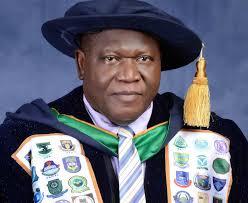How Nigeria can enhance food security – MOUAU VC

![]()
…Says MOUAU occupying only 800 out of 6,500 hectares of its land
From Boniface Okoro, Umuhia

Vice Chancellor of Michael Okpara University of Agriculture, Umudike (MOUAU) in Abia State, Prof. Maduebibisi Ofo Iwe, says the university has the capacity to contribute more to enhancing food security in the country more than it was doing presently if given access to the entire land area the federal government had acquired for the institution at its inception.
He said the school lacked the space it needs to carry out the mandate of a specialized university of agriculture like MOUAU which currently was occupying only to 800 hectares of land out of the over 6, 000 hectares of land acquired for it by the federal government.
Prof. Iwe who made this known during an interaction with newsmen in his Conference Room at the university during a pre-convocation Press Conference held penultimate Thursday, November 23, 2023, said the generates 70 percent of its electricity which gulps N44 million spent on diesel per month.
As a result of the space constraint, the university has been unable to establish the three most essential farms which a university of agriculture must have. He listed these farms as Students Farms, Commercial Farms and Research Farms, thereby severely limiting its capacity and scope of contributions to combating foods insecurity in the country.
As part of its present contributions to food security, the Vice Chancellor said the university was doing exploits in Crop Science and Animal Production.
Prof. Iwe told newsmen that the institution would start production of the animal feeds by January 2024. “Within the next two months, our feed mills will be functioning. We will have enough feeds for our animals and excess to sell for profit,” he had said, adding that the university was working hard to boost its fish production by producing its feeds internally.
Listing some of the universities factories already in operation, Prof. Iwe said: “Our bread and biscuit factory, as well as our water factory are growing exponentially. All our Colleges are also thriving. Our College of Animal Science and Animal Production (CASAP) and the College of Crop and Soil Science (CCSS), for instance, are vigorously driving a level of animal and crop production that is consistent with our vision.”
He said that the institution was enhancing its laboratories with state-of-the-art equipment, adding “we will continue to do so for sciences and engineering.”
Despite these achievements, Prof. Iwe would do more to ehance food security when given access to its lands, noting that the key to achieving this goal was the possession of the Certificate of Occupancy for the university’s land, which he said that the Dr. Alex Otti-led administration was very positive about.
“We want to thank the Abia State government, for actually, the commitment of the present government, even the past government showed a bit of commitment, to our taking hold of the area of land that was ceded to the government for our use. I believe it will happen soon.
“We are daily talking with the host communities, we are also pressing the Abia State government to release the Certificate of Occupancy (C of O) to the university because, without it, you will not know the area that is actually the university’s and the land owners will not also respect our views of our demarcations. I am happy Abia State government is positive about it,” he said.
On the advantages of the C of O, the Vice Chancellor said it would entitle the university to an expanse of land to enhance its agricultural activities. “It is going to help us in the food security and insecurity. The university hasn’t gotten the three farms it needs: the student farms, the commercial farm and research farms. That is why the university had to have up to 6, 500 hectares of land at inception, even though there a few issues on that, but not problem.
“The essence of having large land area for the universities of agriculture is for the universities to be practically-oriented. It is so all over the world, no university of agriculture stays in a 1, 000 square hectares of land. No, it doesn’t work,” the 6th MOUAU Vice Chancellor said.
“So, we continue to appeal to everybody: government, land owners and, of course, the federal government – to push through in ensuring that the university gets to where it should be as far as the land acquired for it is concerned. That is the way this university will address the problem of food insecurity, much more than it is addressing it now. I have already mentioned some of the things we are doing with animals and crops and fishes and all that and our desire to start producing our own feeds which we are going to, maybe, achieve in the next two months.
“So these are some of the contributions we are making to ensure that we grow more food and more people have things (foods) on their table,” Prof. Iwe said.
Explaining how the school was navigating through the harsh economic realities of the time, the Vice Chancellor explained thus: “On the issue of how we are making it, I will say that, first of all, it is by God’s grace. And secondly, we try as much as possible to be prudent.
“The resources available are so slim but we are trying to make sure that we share them, a situation where you spend N44 or N43 million every four weeks to buy diesel does not show that there is (hope for) survival for such a system. But we are surviving.
“So, we have decided to entrench prudence, we have decided to put faith also in what we are doing, decided to believe God that we are able to do more than we can ask or think about. So, that is the way we have been doing it.
“We have been trying to make sure that all our departments receive some level of attention so that no place is left open for any attack.”




